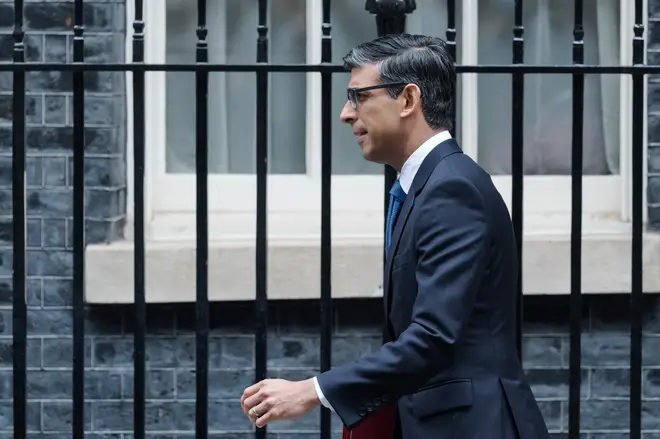
Vanessa Feltz 3pm - 6pm
21 April 2023, 13:01 | Updated: 21 April 2023, 13:11

A report into bullying allegations against Dominic Raab has finally been published after five months - but what did Adam Tolley KC conclude?
Mr Tolley, a senior employment lawyer, was tasked with looking into claims the former justice secretary and deputy PM "bullied and humiliated staff".
The report states the complaints relate to his time in several departments - multiple complaints from his time at the Ministry of Justice (MoJ), one complaint at the Foreign Office and one from the Brexit department.
Read More: 'A good day for British democracy': James O'Brien tears into Dominic Raab following his resignation
The former justice secretary has denied the allegations, insisting that he has "behaved professionally at all times", and slammed the report.
So what did Mr Tolley find?

In relation to the complaint from the Foreign Office, Mr Raab was found to have "acted in a way which was intimidating" and "unreasonable and persistently aggressive" in a work meeting.
The report continued: "It also involved an abuse or misuse of power in a way that undermines or humiliates. He introduced an unwarranted punitive element."
According to Mr Tolley, Mr Raab did not target any one specific with this behaviour and did not threaten anyone with disciplinary action.
"However, he ought to have realised that his reference to the Civil Service Code could well have been understood as a threat," the report adds.
The highest number of complaints over Mr Raab's behaviour came from his time in the MoJ.
Mr Tolley praised those within the department for coming forward, saying they "deserve credit for their courage".
But he concludes there is no "basis for any findings" about Mr Raab's conduct based on these complaints.
Mr Tolley found that the ex-deputy PM described some work as "utterly useless" and "woeful" but found, in relation to the MoJ complaints, that Mr Raab "did not intend by the conduct described to upset or humiliate".
It concludes that "unconstructive critical feedback" and "regular interruption" by Mr Raab is likely to have been intimidating for some civil servants.
The report also states that Mr Raab regulated his "abrasiveness" since the investigation began five months and suggests he should have "altered his approach earlier".
"Since the investigation was announced, there has not been any valid ground for criticism of [Raab's] conduct," the report adds.
In his investigation, Mr Tolley found that Mr Raab has "strong principles" and often works a seven-day week.
He would work "assiduously and typically" from around 7.30am until 10pm on Monday to Thursdays before dedicating Friday to constituency work.
He would also regularly work on weekends, the report adds.
Mr Raab also made "threatening references to the civil service code, according to the report.
Mr Tolley wrote: "This had a significant adverse effect on a particular individual (a different person from the individual who made the FCDO Complaint), who took it seriously."
According to the report, this could be seen as a "form of intimidating behaviour, in the sense of conveying a threat of unspecified disciplinary action".

Mr Tolley said he found a significant amount of evidence of Mr Raab's use of "physical gestures" to communicate
He wrote: "This was put as extending his hand directly out towards another person's face with a view to making them stop talking.
"Another example of such an allegation was loud banging of the table to make a point."
The report added: "I was not convinced that the DPM used physical gestures in a threatening way, although those unused to this style of communication might well have found it disconcerting."
Mr Raab was, however, cleared of shouting and swearing at any staff, as had been suggested in some reports.
Mr Tolley said there was "no persuasive evidence" that such behaviour took place against any individual or generally.

As for the complaint from the Department for Exiting the European Union - or the Brexit department - Mr Tolley concluded that Mr Raab's behaviour could not be characterised as "offensive, malicious or insulting".
While the person making the complaint said it was intimidating, the report says, Mr Tolley "could not make a finding as to whether it was in fact intimidating in this sense".
It adds: "There was no evidence to suggest any abuse or misuse of power."
According to Mr Tolley's investigation, "no-one drew to [Mr Raab's[ attention that his conduct was in any way problematic", in relation to this complaint.

In his own letter to Mr Raab, the prime minister said he accepted his deputy's resignation with "great sadness".
He uses the latter part of the letter to praise Mr Raab's achievements in government, including during the pandemic.
Mr Sunak wrote: "You provided the country...with reassurance and leadership at a moment of profound national concern.
"I was struck by the collegiate way in which you handled the most difficult of challenges."
Read More: Read in full: Dominic Raab's furious resignation letter to the prime minister
Mr Raab has slammed the review by Mr Tolley, saying it "sets a dangerous precedent for the conduct of good government".
He added: "In setting the threshold for bullying so low, this enquiry has set a dangerous precedent.
"It will encourage spurious complaints against Ministers, and have a chilling effect on those driving change on behalf of your government - and ultimately the British people."